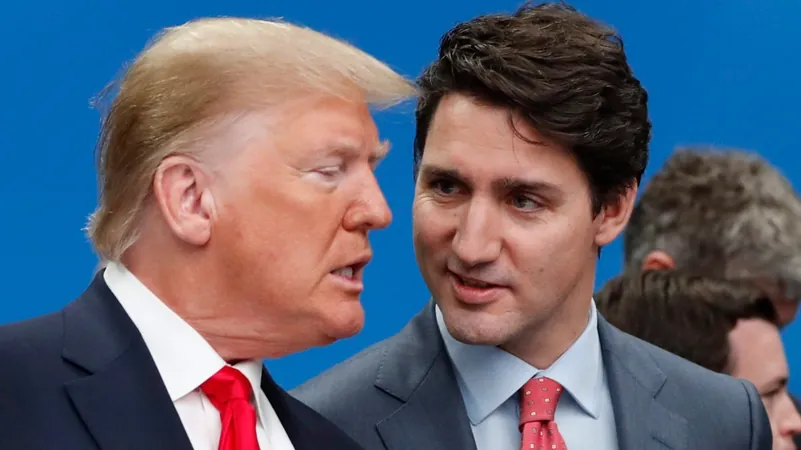
Trudeau Faces Tough Road Ahead for Better Relations with Trump: John Bolton's Insight
2024-12-11
Author: Jacob
Introduction
In the wake of Donald Trump’s election victory, Prime Minister Justin Trudeau may have to adopt a more deferential stance to build a constructive relationship with the new U.S. president. This perspective was shared by John Bolton, who served as National Security Advisor during Trump’s first term. In a recent interview, Bolton suggested that “kissing the ring” might be necessary for Trudeau to foster smoother bilateral interactions with Trump.
Current Tensions
The remarks come amid escalating tensions, particularly concerning Trump’s recent threat of imposing a staggering 25 percent tariff on all imports from Canada and Mexico, an issue that has alarmed many Canadian officials. Shortly thereafter, Trudeau made an unannounced visit to Trump’s Mar-a-Lago resort in an effort to mend ties. During this visit, Trump made comments that hinted at his light-hearted outlook, suggesting that if the tariffs lead to significant economic ramifications for Canada, perhaps the U.S. should consider making Canada the 51st state.
Trump's Commentary on Canada
Trump’s playful jabs at Canada have not gone unnoticed. From posting an AI-generated image of himself draped in a large Canadian flag to referring to Trudeau as “Governor” instead of Prime Minister, the former U.S. president has been vocal on social media. Cabinet ministers in Canada have sought to downplay his comments, labeling them as harmless jokes. However, Bolton cautions that these remarks could reflect the U.S. president's actual perceptions of Trudeau.
Learning from Shinzo Abe
In the past, successful world leaders like Shinzo Abe of Japan navigated their relationships with Trump by maintaining regular communication and personal engagement. Bolton highlighted that while Abe did not overly flatter Trump, he ensured frequent interactions, both on the golf course and through consistent phone conversations. This kind of engagement might serve as a model for Trudeau as Canada faces potential challenges in trade and defense spending.
Confronting Tariff Issues
Bolton pointed out that confronting Trump about tariffs may not be effective, suggesting that Trump has a misunderstanding about how tariff economics truly function. He emphasized that it’s the American importers who ultimately bear the brunt of these costs, which are then passed on to U.S. consumers.
NATO Commitments and Defense Spending
In addition to trade tensions, Canada’s commitment to NATO also looms large. Trudeau has pledged to increase defense spending to meet NATO’s two percent GDP guideline by 2032. However, as the vast majority of NATO members have either met or are close to meeting this benchmark, Canada has been criticized for lagging behind. Trump, who has often threatened to withdraw the U.S. from NATO if member states do not fulfill their financial obligations, may ramp up pressure on Trudeau regarding defense expenditures.
Future Outlook
Bolton believes that if Trump assumes the presidency again, issues connected to Canada’s defense spending will become a prominent point of contention. He insists that increasing defense spending is not only crucial but relatively straightforward, although it may not fully satisfy Trump’s expectations.
Conclusion
Overall, as Canada prepares for its ongoing relationship with the U.S., the need for Trudeau to navigate carefully through these tumultuous waters is clear. With Trump’s unpredictable nature and Bolton’s insights into his mindset, it seems Canada will need to employ diplomatic agility and strategic communication to ensure a stable and beneficial partnership moving forward.









 Brasil (PT)
Brasil (PT)
 Canada (EN)
Canada (EN)
 Chile (ES)
Chile (ES)
 España (ES)
España (ES)
 France (FR)
France (FR)
 Hong Kong (EN)
Hong Kong (EN)
 Italia (IT)
Italia (IT)
 日本 (JA)
日本 (JA)
 Magyarország (HU)
Magyarország (HU)
 Norge (NO)
Norge (NO)
 Polska (PL)
Polska (PL)
 Schweiz (DE)
Schweiz (DE)
 Singapore (EN)
Singapore (EN)
 Sverige (SV)
Sverige (SV)
 Suomi (FI)
Suomi (FI)
 Türkiye (TR)
Türkiye (TR)